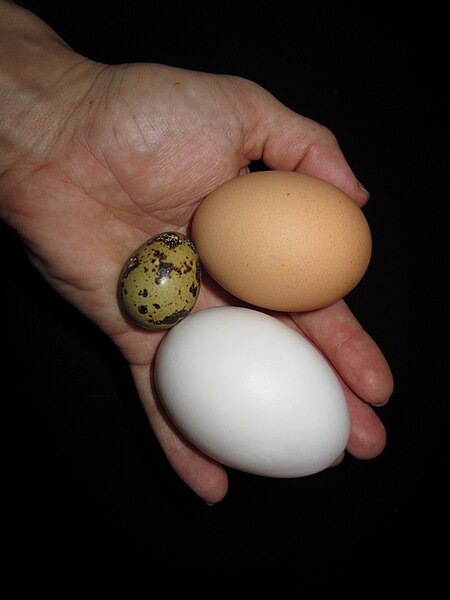Eggs are a rather universal food amongst omnivores and carnivores. They are nutrient dense little packages that are easy to consume, and in our cases store and transport. It’s therefore no coincidence that eating eggs is a rather standard part of human diets in regions all over the planet where interactions with birds is common. While there is no specification on the species of bird eggs to eat, you are probably going to most likely be encountering chicken eggs at the store.
Eggs come in a variety of shapes and sizes and have very different nutritional contents depending on the species of bird you are eating. On the small end you will have something like a quail egg, which is a fraction of the size of your standard chicken egg.

Quail egg compared to medium and large chicken egg (HT: Wikipedia)
Then of course on the large end you could actually find an ostrich egg which makes the chicken egg to quail egg comparison look almost uneventful:

Chicken to ostrich egg comparison
Now, it’s not just the size of these eggs that is different. You will see a very different ratio of fats to proteins from one species to another. Because of that you will also see a lot of differences in the texture of these eggs as well.
While there will also be differences in the nutritional profile from species to species you will also find a very different profile within one species depending on how it is raised and what their diet is. Your average store bought chicken egg that has been fed whatever standard industrial foods they feed chickens in their massive warehouses will be quite a bit different than what you find in chickens that are fed a more natural diet. This isn’t just some minor change in the vitamins and minerals but also in what types of fat are in the eggs. Chickens raised on a more natural diet will have a lot better omega-3 to omega-6 ratios of their fat content. That’s good news for people that aren’t into eating fish but still want to get omega-3’s from more natural sources.
It’s because of the much better nutrient profile that the Paleo community recommends that people get their eggs from pastured chickens rather than conventional agriculture. As this Mother Earth News article, highlights eggs from pastured chickens have one third of the cholesterol, one quarter of the saturated fat, over two times as much omega-3 fatty acids, 3 times the vitamin E and 7 times the amount of beta carotene (why they are a much more orange color). Don’t confuse these for “organic” or “omega-3” eggs. Organic eggs may or may not be pasture raised. Omega-3 eggs are just conventionally raised chickens but with add omega-3’s added to their diet.
Unfortunately as you can see there is a lot of greenwashing in the industry when it comes to this. Ideally you will be able to get your eggs from a local source that you can confirm is raising the chickens in a pastured manner. Be warned however that the price of eggs (and chickens) raised in this manner is substantially higher than a conventional product. If you have access to it and can afford it, you should definitely do what you can to buy these products instead. If you don’t have access to them however go with the closest option that you can find to these products and try to do your homework on the internet to find out which manufactures are just hiding behind a marketing message so they can charge you more for the same product and which ones are legitimately raising their livestock in a different manner.




 2014-03-25
in
2014-03-25
in

 3 min read
3 min read